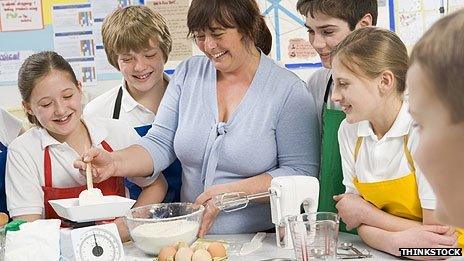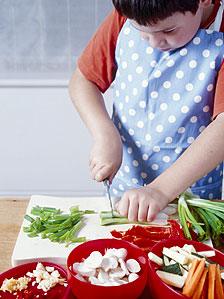Why cooking skills are the key to healthy eating
- Published
- comments

Parents who want their children to eat more fruit and vegetables should give them an apron and let them cook, recent research suggests.
By teaching our children to cook they are more likely to grow up to be healthy adults because they have a better knowledge of cooking techniques, preparing food and new tastes.
Watching talented amateur cooks on Masterchef and gazing longingly at meals concocted by TV celebrity chefs is fine, but actually doing the cooking ourselves is what matters.
When it comes to young children, I Can Cook on CBeebies might hold their interest while you put on the washing but it's no replacement for getting out the butter and flour and letting them make a mess, or so new research has found.
A study in Liverpool, external, by City University London, found that cooking classes aimed at both school pupils and adults had a positive impact on eating habits, with more pupils saying they ate more fruit and veg following the sessions.
Another study, external, carried out by the School Food Trust, which measured the impact of a national network of school-based cooking clubs for four to eight years olds, found that learning to cook improved their recognition of healthier foods - and their desire to eat them.
With the UK in the grip of an obesity epidemic, is this the answer to improving our diets and our lifestyles?

Experts say children can learn a lot about food from cooking themselves
On hold
The push to get school children to eat more healthily is not new, with Jamie Oliver among many others campaigning against unhealthy 'turkey twizzlers' on school dinner menus for years.
But the previous government's plan to include cooking skills in the curriculum for 12 to 16-year-olds is now on hold while the current government reviews the national curriculum, to come into force in 2014.
At primary level, cooking is still part of the curriculum but the quality of lessons is thought to vary enormously from school to school.
This is where charities and social enterprise initiatives can play an important role, inside and outside school.
Jacqui Lawson, a teacher of food technology at Enterprise South Liverpool Academy, knows how valuable cooking lessons are for school pupils.
She organised for a group of her sixth form students to take part in a secondary school cooking competition run by Can Cook, external, a social enterprise.
The students received three hours of training from a chef, before practising cooking some recipes and then their dishes were judged by a panel of professionals.
Beef burgers
"They were trying things they hadn't tried before, like Spanish cooking, Thai food and how to make burgers from scratch with lean mince beef.
"At first they were sceptical, but they learnt to cook restaurant quality meals and the experience also taught them about working as a team and independently - lots of skills useful for later in life."
After the sessions, students' comments included, "It was challenging in a good way", "it was fun learning how to cook", "the chicken was quite hard to understand but the chefs helped" and "I felt I could do all of the stuff we were shown".
Since 2007, Let's Get Cooking, external has helped more than 1.7m people improve their cooking skills through more than 5,000 school-based clubs.
A survey of 2,500 of its members found that 92% used their new skills again at home and more than half said they were eating more healthily as a result of learning to cook.

Primary school children are currently taught cooking as part of the curriculum
Of the 335 children surveyed, an increased number said they ate more bananas, tomatoes and peas than before.
'Less fatty'
Rob Rees, chairman of the School Food Trust, says all children should have the chance to learn to cook.
"Fundamentally, being able to cook is a life skill which helps children grow into healthier adults, and that's why our evidence to the national curriculum review calls for practical cooking to be compulsory for all children."
Professor Martin Caraher, author of the Liverpool study from the Centre for Food Policy at City University London, said the range of meals cooked at home following the Can Cook sessions had changed.
"They were less fatty and less sugary than prepared previously, and there was less use of microwave and instant meals, suggesting an increased knowledge of healthy eating."
But Prof Caraher says it is about changing the culture, giving children simple and healthy recipes to take home and cook and giving their parents the basic skills to help nurture their enthusiasm for cooking.
- Published30 June 2010